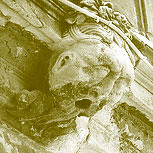
Considering my recent reading, I think this is a relevant question. I've just finished Michel Foucault's essay on "What is an Author?" Much has been made of the portion of the essay that deals with what he calls "author-functions" and there is a reader's guide to this essay that is short and sweet and deals with this section nicely.
I've often gotten much enjoyment out of Foucault, being that he is usually so wonderful about backtracking to the origins of institutions, I was hoping really to get an over-view, and idea of the evolution of the authorial structure, but he only really gets into that at the end. First, though, he gets a little stuck on names. And this is what really interested me.
Like Barthes and Derrida, he rejects the writer's supremacy as the arbiter of the meaning over any particular piece of the writer's work, but he has a little snipe at them, suggesting this isn't as radical as it sounds; he calls it an "empty affirmation". He entertainingly attempts to crystallize what we mean when we talk about a "work" - not Nietzsche's laundry list, for instance. He questions why we feel that certain portions of an author's writings are 'work', and other bits are not. Although it turns out that, for Umberto Eco, laundry lists can be important (see "Foucault's Pendulum"), and he can clearly give as good as he gets (Eco says that there is no connection or reference, but you have to wonder).
What Foucault asks us to consider is the value we put on an author's name. Certain things can affect that value, others don't:
"If I discover that Shakespeare was not born in the house we visit today, this is a modification that, obviously, will not alter the functioning of the author's name. But if we proved that Shakespeare did not write those sonnets which pass for his, that would constitute a significant change and affect the manner in which the author's name functions."
This portion of the essay got me thinking about my name, or rather, the lack of it, really. It's not that I don't have a name, but I don't use it for my writing; I use a pseudonym. Moreover, I don't even use a proper name, like Mary Smith, or Catherine Le Blue. I use a descriptor - a word for a type of person, not an individual.
I can't claim any foresight in having done this. I started out using my pseudonym because I couldn't use my real name, and because I liked the idea of representing myself as what I was, rather than who I was.
The entity that is named as the writer of my works has lived on the net for about eight years now.
About 4,000 people a day read my stories and, for the most part, I don't think they think much about the author of them. The ones that do are free to make up any story they want about who the writer of these stories is, what she does, how she lives.
In the absence of any available information, I've noticed that they make stuff up. Certainly, from the comments and emails I get, it seems I'm a beautiful, mysterious, extremely vivacious, thoroughly over-sexed individual.I didn't really have to do much work crafting the entity I am online, people are happy to do it for me, after reading my stories. This leads me to believe that many readers assume that most fictional works are, unless it's completely unfeasible, autobiographical.
I've often wondered whether I should let them know that, in reality, I'm a frumpy, rather plump, middle-aged woman and that the only kink I get to witness on a regular basis is when my neutered cat tries to fuck the mango tree in my garden. But that would be unfair and mean, wouldn't it? After all, the author of my stories has become a story in itself, written by the readers. Do I have a right to tell them that they aren't writers and they don't get to invent fictions of their own? Barthes would counsel me not to. Not only does my life give no worthwhile insights into the text, but I don't have a right to close off possible meanings created by my readers, in the act of creating me, either (Lye). And to be totally honest, I like it this way.
In an earlier post, I tried to be honest about why I write. I suggested that it was egotism and a quest for immortality of a sort that drove me. What I wanted to be clear about here is that it isn't that I want to live forever, me, Madeleine Morris. It is the viral passing on of idea-material which is hybridized by the reader that I want to engage in.
Much of the discussion surrounding authorship, and authorial privilege is probably worth revisiting in the light of the Internet and the way writers on the internet are using this platform. If Foucault wasn't terribly impressed by the assertion that the author is dead, I'm not all that impressed by his assertion that the author's name is of questionable and arbitrary value.
References:
Foucault, Michel. "What is an author?." Generation Online. 1969. 5 May 2008 http://www.generation-online.org/p/fp_foucault12.htm
Lye, John. "The 'Death of the Author' as an instance of theory." Department of English Language & Literature. 2000. Brock Univerity. 5 May 2008 http://www.brocku.ca/english/courses/4F70/author.php.
900 words (5,750 and counting - sorry for the overrun)
What's in a Name?
Monday, May 5, 2008Posted by Madeleine Morris at 4:39 AM
Subscribe to:
Post Comments (Atom)

0 comments:
Post a Comment